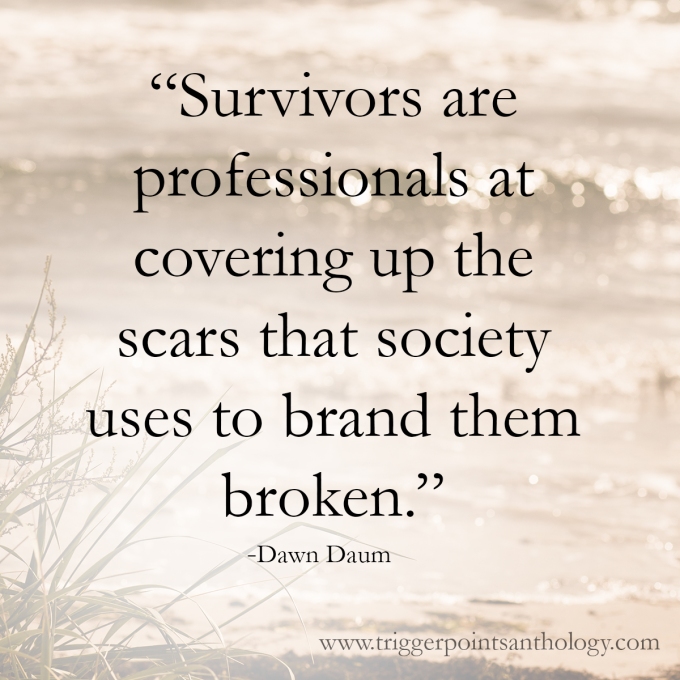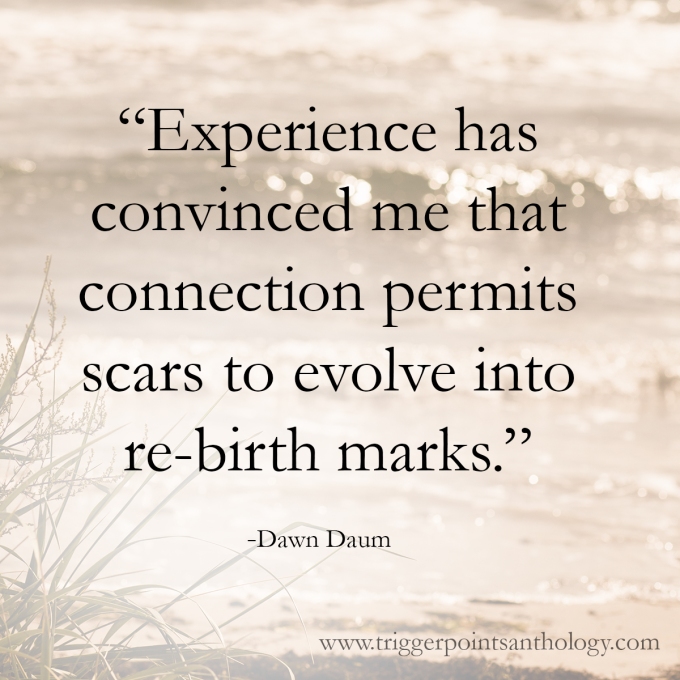"Don't you worry an employer will see the personal stuff you have shared online?"
******
When I began writing publicly about my life and experiences with depression, and as a parenting with an ACE score of 9, my career in the mental health field was already on hold. At the time, I was a stay at home mom who needed an outlet. Now being back in the field, I sometimes get asked the question above. Truth is, yes, I do worry. But not for the reasons you may think. It has more to do with my feet, than a fear of compromising relationships and employment.
I "came out" as a sexual abuse survivor online a year before I resumed my career as a mental health care manager. I wrote about my experiences on a personal blog and for popular sites like Scary Mommy and Huffington Post. I talked to other survivors and supporters online, and face to face with people in my personal life that never knew.
I went back to work about six months before publishing a book on the topic of parenting as a survivor of abuse. I didn't tell anyone at my new job about my blog or the book, and had no idea if anyone had Googled me before I started. I felt like I was walking around with this hidden identity tucked away. Which wasn’t much different than the way I’d always felt.
Survivors are professionals at covering up the scars that society uses to brand them broken.
The difference now was I had exposed myself online, leaving a part of my identity and reputation in a new place of employment vulnerable to judgment. I leaked a “secret” safely from the comfort of my own home, and it was only a matter of time before I had to come face to face with it in public.
There came a point when I mentioned in casual conversation at work that I enjoyed writing. I could feel my feet turn to stone, and start spinning like the roadrunner at the same time. Before the last word fell from my mouth, I was formulating a plot to run. I knew I had just opened the door for someone to ask, "What do you write about?" Inevitably, the question came up and I directed a few people towards essays I wrote about the trials and tribulations of motherhood, with only a dash of my “crazy” sprinkled in.

Slowly but surely the word started to trickle out that I was co-publishing a book, in and outside of work. I started talking about how ACEs science validated the stories in this book. I started to talk about what the book was about - parenting as a survivor of childhood abuse - and had to answer “Yes” when asked, “Are you doing this because it happened to you?”
And again, frozen but fidgety feet.
I felt empowered by being in control of the conversation, but it stung my insides a little, as if the word sexual abuse sent a message to every nerve in my body to go electric for a split second. Before then, I had only written about my experiences. Being exposed like that, on purpose, looking someone in the eye as pieces of my story willingly poured out is something I had never experienced. It set my heart free, but imprisoned my feet in a constant state of "Freeze" and "Run!"
Even though every single person around me was supportive and championed my goal to speak about and for parenting survivors, I worried. I worried that I was breaking the unspoken code that people in the mental health field aren't suppose to open up their own baggage and allow others to see what's inside. We are suppose to draw firm lines in the sand, because exposing ourselves could make others uncomfortable, damaging the chance for advances in your career, and/or jeopardize relationships with clients. I kept waiting for the backlash.
Two years later, it hasn’t happened yet.
ACEs, more often than not, are at the root of the psychological and medical illnesses mental health workers help people manage. I have become someone who is recognized as having the ability to understand what that means in regards to a person's recovery work. I am at times sought out to work with clients who have extensive trauma histories, because I am capable of acknowledging pieces of their stories that aren't commonly recognized as important, while helping them to navigate recovery through medical, mental health and community services.
I’m able and willing to share so much about myself and my story because I recognize the reality of how prevalent my story is. I know this not only from the hundreds of charts I’ve read and the countless mental health patients I have worked with throughout the past ten years. The confirmation that my experiences are far from rare show in the lingering eye contact among those I’m speaking to - the unspoken coming out among survivors.
I’ve been contacted by college professors, stay at home moms, a neurophysicist, administrative professionals, those living in houses surrounded by a white picket fence and those that are constantly chasing a rent they can actually afford - all with stories about how ACEs have affected their ability to be a parent. I have experienced and witnessed the abuse a person experiences bleed out as mental health symptoms, ranging from full on delusional thinking, to unexpected panic attacks, to not a fuck given about living or dying.
I share my story not because it’s easier for me, but because I choose to use empathy and validation to establish connection. Experience has convinced me that connection permits scars to evolve into re-birth marks.
Setting appropriate boundaries is a priority in my line of work. I recognize that disclosing personal information to clients can be counterproductive in their recovery, but that doesn’t prevent me from allowing my own experiences to join me quietly in interactions with clients. Allowing all of me to be present enables authentic eye contact, compassionate body language and an empathetic attention span. That can speak volumes to a person sitting across from you.
I don't worry that I am going to be fired from my job, or that I won't be considered for a different one in the future, because my personal advocacy work exposes pieces of my life most in my position would keep hidden away. I worry about those damn feet of mine.
 I worry that with even the slightest indulgence of vulnerability, I'll feel the hangover that always follows. I'm worried that my feet will never be still and calm.
I worry that with even the slightest indulgence of vulnerability, I'll feel the hangover that always follows. I'm worried that my feet will never be still and calm.
That my volume button is defective and I can't or won't talk loud enough or often enough to actually make a difference. I worry that my feet will give out.
I worry that the chatter in my head will convince my feet to give up on carry the weight that comes with advocacy.
You see, my brain gets it. My body doesn't yet. I still have work to do. It's daunting to stand at the top of one mountain you just conquered and realize there is an even bigger one in the way of where you're going. My feet are tired. Some days, I don't think they will ever get the message that it’s ok to stand still, tall even, when the sting of vulnerability hits.
So back to the original question - Do I get nervous about the amount of personal information I share? Yes! There is a risk involved when exposing personal aspects of my life while professionally working with the public. However, to me, it is more of a risk to not acknowledge where my empathy and knowledge comes from - especially in today’s cultural and political atmosphere.
And as far as those damn feet go, I can only hope that in time, as they carry me further and further into the public view, they will keep me grounded in spirit, and not fear.


Comments (15)